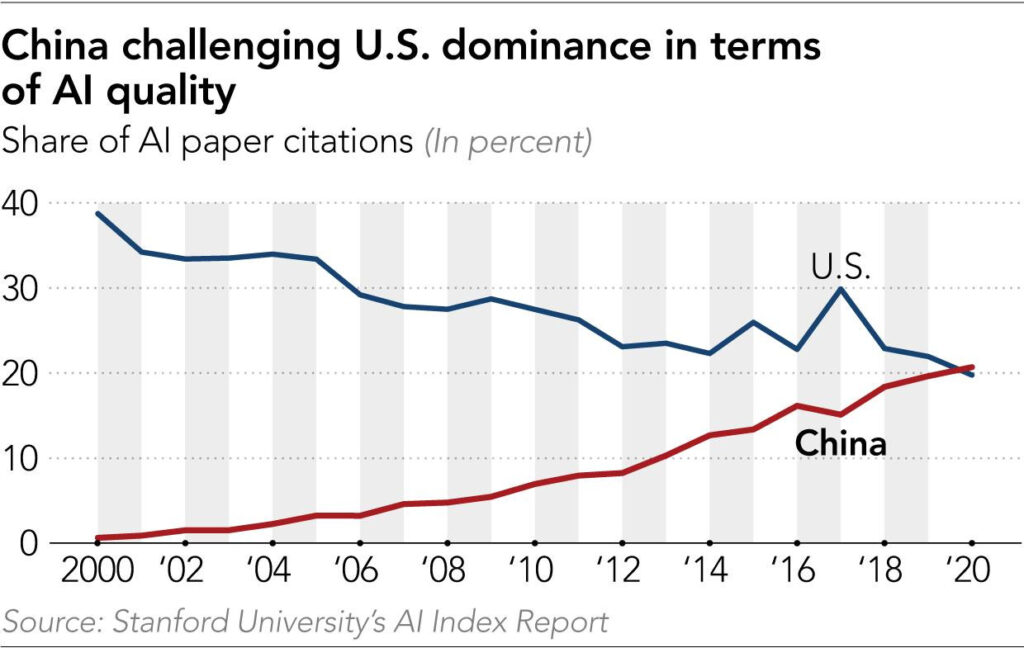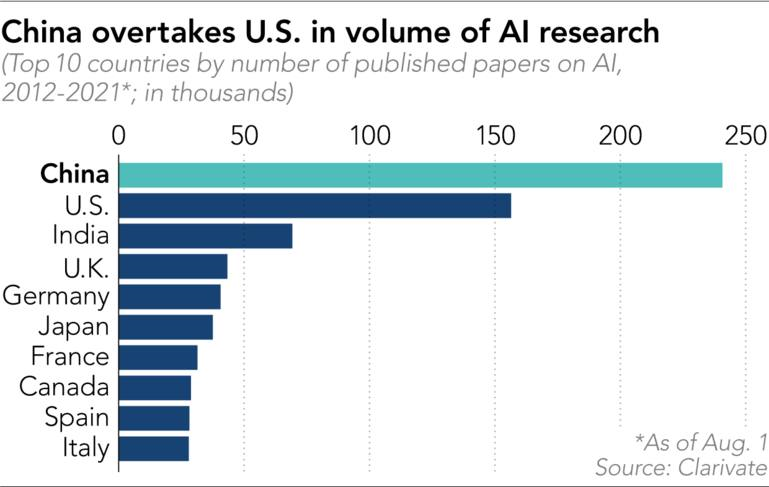Chinas AI supremacy – Why U.S. and EU are loosing the race for AI
China is putting considerable effort into ensuring their AI supremacy - Understand how they do it
In the last few years and decades it was the Plan of China 2025 to ensure that it will be a leading economy by 2049 for their 100th aniversary. And it seems AI might be the first part where they gain leadership
When China announced its “Made in China 2025” plan to become the leading economic superpower in 2015 the world was looking at ambitious goals. China wants to make sure that for their 100th anniversary in 2049 they are leading in their 10 core industry areas whereas one area overspans all of these industries – algorithms and what we call in marketing terms: Artificial Intelligence (AI)
Now some years later we already experienced a big rush towards their goal to achieve supremacy. In an area where there is a big run for being a leader, it is about intelligent algorithms, industry applications of algorithms, and even other efforts to use data and their insights for better efficiency, new research, and even better integration. The Chinese ambition can be also seen when they are opening up the biggest AI system in the world. For quite some time GPT-3, an OpenAI project, was believed to be one of the most sophisticated AI models for language processing and more with over 175bn trained parameters. In 2021 the WuDao Model 2.0 was released with a staggering 1.75tn parameters. (News source)
But why does it matter? Well … training such models is extremely difficult, expensive, and also needs a lot of resources. The more input variables you have, the more parameters you train, the better the model gets but it uses immense resources to make this possible. The WuDao Model was created by the Beijing Academy of Artificial Intelligence (BAAI) and is now being used by leading Chinese companies like Xiaomi as it is also one of the first multimodal AIs around, that means that it can not only do one single thing but is able to multitask and perform different task combinations like picture and text creation instead of just creating text like GPT-3.
Index
Chinas rise to AI supremacy
In recent news it was more and more about Europe and U.S. losing ground to China when it comes to AI development and investment. Even top executives and politicians are weighing in on this topic as this is a topic like the space race in the 60s. Everyone wants to be the first one to use these algorithms to gain an edge on economic development, material discovery, etc.
AI research and quality of research
One of the easiest measures for research and research success might be the number of publications and also how many times they get cited by other sources. For a decade China is pushing this field far which lead to a lot of speculations that they are overtaking especially the U.S. when it comes to AI research and AI supremacy.
One of the most important criteria might be the quality of these publications. When looking at the following graphic which helps to understand the share of citations, it becomes clear that china is gradually taking over the back then-leader U.S. when it comes to being cited in AI papers.

But not just the quality is deciding. They also ramped up theresearch and publication speed. The large investments in the last years are paying off when looking at these numbers. China is now publishing more AI papers than the U.S. and India combined. But this will continue to grow as further investments are being done due to the Communist Party commitment and economic support programs.

Fast AI adoption and the right ecosystem as a basis
Due to the many reasons what AI could potentially achieve, it is for a lot of regions, countries, and even research centers the biggest priority to be at the forefront when it comes to finding and developing these algorithms but also applying them. In recent years China was also a big playground for their tech industry with easy access in the market and low entry barriers – All under the premise of “winning at all costs”. Even in recent years, the Chinese government needed to also take care of the data protection of their citizens (like the new personal data protection laws).
But one thing will not change so fast with China, the public perception of technology and the strong support for new technologies. Payments are already almost 100% digital nowadays, there are no areas where digital offerings are not already implemented. Also due to the rise of platforms like WeChat which literally integrate everything. Just imagine one single provider that is like Facebook, but it would also acquire Visa, Mastercard, and offering services from Uber, Amazon, Instagram, and many more.
When you take such a broad userbase, high integration, and also fast adoption of new technologies, you have everything you need to build a strong ecosystem that can leverage algorithms in many ways. Many critics also see potential downsides as these algorithms also interfere with personal space, make surveillance easier, and might even manipulate society.
One example of this kind of manipulation can be seen within our Social Media feeds – We only see what the algorithm allows us to see. So we live in a “filter bubble”.
Now imagine what would happen when your whole life could become dependent on a filter bubble?
Global tensions & AI warfare
One might ask why so many people worry that China might be the first one to analyze their people and potentially steer them in some direction. Because this is not the most pressing issue why Biden spoke in February in Munich and said that the EU and USA need to work together in order to not lose ground and fall behind on AI topics. The reason is that the next big wave in warfare will be AI and this worries the world as there might be a big shift in global power balance for the country first using advanced AI systems for military warfare.
AI warfare has many facets and these can be autonomous systems (drones), autonomous robots but also cyber attacks, hacks, network security, and many more. Cracking passwords, infiltrating countries, launching infrastructure attacks and many more fields are at stake as we have seen that recent hacker attacks could stop pipelines or even shut down complete regions with codes and more. An imbalance in this field might lead to the next cold war, but this time it will not be about nuclear bombs and ICBMs, it will be about codes, network security, and many other aspects of cyber warfare including robotics and drones.
The holy grail – Artificial General Intelligence
There is another area where “the winner takes it all” is a big topic and of interest for every nation – it is also one of the most controversial but also complex topics in AI is also the so-called, Artificial General Intelligence (AGI). WuDao 2.0 was also a big milestone in this field. Where a system is multimodel and can do many different tasks and not only one task they are being trained on. Till now the biggest trained models vom GPT-3 up until Microsoft, IBM, Google, etc. are all trained for a single modal use-case (most of them for language processing).
The goal of AGI will be to have a system that is capable of any tasks, just like a human brain, and even think for themselves on solving issues without any further input needed. We can also think of AGI in a more Sci-Fiction term, when we speak about AGI like a living computer system maybe even self-aware and with own consciousness.
Conclusion on China AI supremacy
Recent years have shown that China is really determined to become a leading innovator in all different fields of Artificial Intelligence. Their efforts have also involved massive investments, large commitments by companies but also the Communist Party, and these efforts are now paying off. This commitment together with a very adaptive and tech-loving society leads to fast adoptions across different fields. The world politics is still worrying about other implications like AI warfare and the cyber risks associated with AI supremacy but it will be interesting to see how especially the U.S. will react and which way the European Union will go in the future.

Comments are closed.